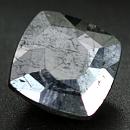|
|
||||||||||||||||
|
||||||||||||||||
|
||||||
|
|
|
|
Enargite
|
|
| | |
| Discovery in 1850; IMA status: Valid (pre-IMA; Grandfathered) | ||
|
| ||
|
Chemistry |
|
|
| |
|
Cu3AsS4 | |
|
|
Copper Arsenic Sulfide |
|
Molecular Weight: |
393.82 gm |
|
Composition: |
Copper |
48.41 % |
Cu |
|
|
|
|
Arsenic |
19.02 % |
As |
|
|
|
|
Sulfur |
32.57 % |
S |
|
|
|
|
|
100.00 % |
|
|
|
|
|
|
||||
|
Classification |
|
|
| |
|
Sulfides | |
|
2/C.14-10 | |
|
|
2 : SULFIDES and SULFOSALTS (sulfides, selenides,
tellurides; arsenides, antimonides, bismuthides; sulfarsenites,
sulfantimonites, sulfbismuthites, etc.) |
|
Related to: |
Dimorph of Luzonite. |
|
Varieties: |
Argentian Enargite, Stannoenargite |
|
Synonyms: |
Clarite (of Sandberger), Garbyite, Guayacanite |
|
|
|
|
Crystal Data |
|
|
|
|
|
Tabular on {001}; also prismatic by elongation of [001]; crystals up to 15 cm. Prism zone typically deeply striated k [001]. |
|
|
Twin plane {320} common, rarely as interpenetrating pseudohexagonal trillings. |
|
|
|
|
|
Physical Properties |
|
|
|
|
|
Perfect on {110}, Distinct on {100} and {010}, Indistinct on {001} |
|
|
Irregular/Uneven |
|
|
Brittle |
|
|
3.0 |
|
|
4.45 (g/cm3) |
|
|
None |
|
|
Not Radioactive |
|
|
Health Warning: |
Contains Arsenic - always wash hands after handling. Avoid inhaling dust when handling or breaking. Never lick or ingest. |
|
|
|
|
Optical Properties |
|
|
|
|
|
Grayish Black to iron-Black; in polished section, Gray to pale Pink-Brown; deep Red internal reflections may be observed. |
|
|
Opaque |
|
|
Metallic to Dull |
|
|
R1–R2: (400) 24.8–26.2, (420) 26.6–26.0, (440) 26.5–25.6, (460) 26.5–25.9, (480) 26.2–25.8, (500) 25.6–25.6, (520) 24.9–25.3, (540) 24.4–25.2, (560) 24.0–25.2, (580) 23.8–25.4, (600) 23.8–25.9, (620) 24.1–26.5, (640) 24.6–26.9, (660) 25.2–26.9, (680) 25.6–26.8, (700) 25.7–26.7 |
|
|
None; Opaque |
|
|
None |
|
|
Weak |
|
|
Strong; dark violet red or olice green tones. Color in reflected light: grey to light pink brown. Internal reflections: deep red. |
|
|
|
|
|
Occurances |
|
|
|
|
|
Geological Setting: |
In hydrothermal vein deposits formed at medium temperatures. Also as a late-stage mineral in low-temperature deposits. |
|
Common Associations: |
Pyrite, Sphalerite, Galena, Bornite, Tetrahedrite–Tennantite, Chalcocite, Covellite, Barite, Quartz |
|
Common Impurities: |
Sb, Fe, Pb, Zn, Ag, Ge |
|
Type Locality: |
San Francisco vein, Morococha District, Yauli Province, Junín Department, Peru |
|
Year Discovered: |
1850 |
|
View mineral photos: | |
|
|
|
|
More Information |
|
|
|
|
|
| |
|
|
|
|
Distribution:
A widespread mineral, may be an important ore of copper,
but not commonly well-crystallized. Only a few localities
can be mentioned. In Peru, from Morococha [TL] and Cerro
de Pasco, with exceptional crystals from the Mina Luz
Angelica, Quiruvilca. In Argentina, in the Sierra de
Famatina, La Rioja Province. In the Philippine Islands,
at Mancayan, Luzon. From the Chinkuashi mine, Keelung,
Taiwan. At Kaize-mura, Nagano Prefecture, and in the
Teine mine, Hokkaido, Japan. In the USA, in splendent
crystals from Butte, Silver Bow County, Montana; in
Utah, in the Tintic District, Juab County; in Colorado,
in fine specimens from a number of mines in the Red
Mountain district, San Juan County In Austria, at Matzenköpfl,
Brixlegg, Tirol. From Bor, Serbia. In Italy, on Sardinia,
at Alghero and Calabona. At Tsumeb, Namibia. |
|
|
We
have not photographed our Enargite gems yet. Please
check back soon. |
